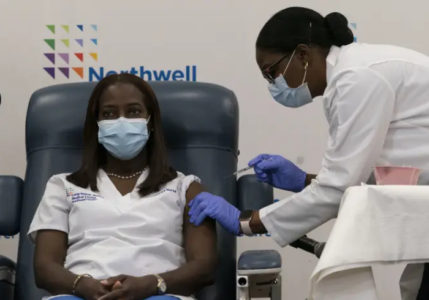Sober Russians, missing twins, affirmation surgery, and more
15 Dec 2020
Posted by Andrew Kantor
You know this, but we’d be remiss if we didn’t mention it
Sandra Lindsay, a critical care nurse in Queens, NY, became the first American to get the Covid-19 vaccine, as the initial distribution begins.

Maybe this time they’ll listen
Once again, people who know better are shouting from the rooftops “Don’t gather for the holidays!” Georgia — and the country — continue to set records for infections and deaths from Covid-19.
More than 10,000 Georgians have been killed by this virus.
With the vaccine only months away, wouldn’t it be embarrassing to be infected now?
At least it’s not twins
Low virulence, Covid-19 restrictions, vaccinations — whichever combination it was, it looks like this year’s flu season is shaping up to be a mild one. The dreaded “twindemic” hasn’t happened. Let’s hope it stays that way.

Some twins you just want to avoid
Sadness from the gut
Add a new trick to the repertoire of gut microbes: mood regulation. French researchers found “that an imbalance in the gut bacterial community can cause a reduction in some metabolites, resulting in depressive-like behaviors.”
Interesting note: They figured out which bacteria were missing and…
… then demonstrated that an oral treatment with the same bacteria restored normal levels of lipid derivatives, thereby alleviating the depressive-like behaviors. These bacteria could therefore serve as an antidepressant.
Whispering sweet nothings
Can you reduce opioid use after surgery with … music? Apparently so, at least according to German researchers.
Even with the brain shut down, it’s possible that auditory pathways stay open. So they tested surgery patients: One group heard no sound, while the “intervention” group heard soft voices saying positive and confidence-boosting things with quiet background music.
The researchers found that patients in the intervention group needed significantly lower opioid doses within 1 day of surgery [and] also had fewer participants who required opioids after surgery, with just 63% of participants in the group needing opioids compared with 80% of those in the control group.
A drug for heart calcification
I didn’t know this: calcific aortic valve disease is the third most common kind of heart disease, and there’s no drug to treat it. Until now (maybe).
Scientists at Gladstone Institutes say they have “now discovered a potential drug candidate for heart valve disease that works in both human cells and animals and is ready to move toward a clinical trial.”
Like everyone these days, they used machine learning — first to determine which genes went bad, then to see which molecules turned them from bad to good. Then they treated mice (successfully) and now they’re ready for human trials.
Russia vs sobriety
Russians are being told not to drink alcohol for two months after getting the Covid-19 vaccine. While Russians weigh the pros and cons, American experts say, “Nah, you’re good.”

Three cheers for America!
Universal flu vaccine takes another step
Researchers at Mount Sinai have developed a vaccine that “induces immune responses to a wide spectrum of influenza virus strains and subtypes” and shows “strong and durable results.”
This is a notable step toward a universal flu vaccine because these results came from a phase 1 human trial.
Calling it a “major advance over conventional vaccines,” this “chimeric hemagglutinin (HA)-based vaccine” targets a different part of the hemagglutinin protein that lets the flu bind to cells. The flu’s H’s and N’s might change, but this target protein is the same.
Can’t really say this is surprising
“Increased Social Media Use Linked to Developing Depression, Research Finds”
Compared with participants who used [fewer] than 120 minutes per day of social media […] young adults who used more than 300 minutes per day were 2.8 times as likely to become depressed within six months.
The long read: Covid vaccine recipe
Wondering what exactly is in Pfizer’s Covid-19 vaccine? Wonder no longer.
Non-pharma science news: “Push the big red button, human”
“Robots encourage risk-taking behaviour in humans” according to University of Southampton researchers.


